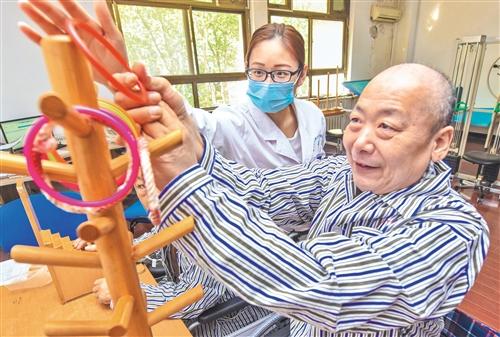


(Photo/Xinhua)
The senior market in China is expected to become a new economic growth point, but is faced with a severe shortage of products and services designed specifically for senior citizens, Economic Daily reported on April 18.
On April 16, China’s National Working Commission on Aging released a research report on the consumption and demand of elderly citizens in China, compiled from a demand-side perspective. It indicated that by the year 2020, China's senior market will be worth 3.79 trillion yuan ($566.2 billion), meaning a huge demand for products and services.
China’s seniors represent huge market potential, said the report, while pointing out that the market group is also currently troubled by a significant supply-demand imbalance.
“Although subsistence requirements drive elderly consumption, conventional consumption hotspots have been declining slowly, and diversified market demands will gradually promote the steady development of products and services for seniors,” said Wang Lili, vice director of the Research Institute of Economy and Industry on Aging under the China Research Center on Aging.
Even though there are various nursing institutions for the aged, over 82 percent of Chinese seniors prefer to stay at home in their later years, said the report, pointing out a clear discrepancy between supply and demand.
“The so-called ‘old-age care at home’ does not mean the elderly want to be fully supported by their family members, but reflects the choice of many Chinese seniors to live out their later years in the comfort of their own homes,” explained Wang.
With the increase in income and changes in consumption patterns, seniors are paying more attention to health information and showing a greater demand for health information and services, suggested the report.
While incapacitated, very old or spouseless elderly care users may require more time and individualized care, the supply of such services falls short, as public nursing institutions focus on essential services for those who can take care of themselves, indicated the report.
The report suggests that on the one hand, the industry requires policies and systems to help develop demand-oriented areas.
On the other hand, relevant enterprises should endeavor to develop diversified, individualized, and user-friendly products and services based on correct market positioning and accurate market segmentation.
“The seniors market is now dominated by such products as rehabilitation assistant devices, health products, and nursing materials. Localized innovation in electronic and technological products which help seniors with hearing, walking, taking a bath, and rehabilitation will help boost consumption and expand business,” noted Wang.

 Award-winning photos show poverty reduction achievements in NE China's Jilin province
Award-winning photos show poverty reduction achievements in NE China's Jilin province People dance to greet advent of New Year in Ameiqituo Town, Guizhou
People dance to greet advent of New Year in Ameiqituo Town, Guizhou Fire brigade in Shanghai holds group wedding
Fire brigade in Shanghai holds group wedding Tourists enjoy ice sculptures in Datan Town, north China
Tourists enjoy ice sculptures in Datan Town, north China Sunset scenery of Dayan Pagoda in Xi'an
Sunset scenery of Dayan Pagoda in Xi'an Tourists have fun at scenic spot in Nanlong Town, NW China
Tourists have fun at scenic spot in Nanlong Town, NW China Harbin attracts tourists by making best use of ice in winter
Harbin attracts tourists by making best use of ice in winter In pics: FIS Alpine Ski Women's World Cup Slalom
In pics: FIS Alpine Ski Women's World Cup Slalom Black-necked cranes rest at reservoir in Lhunzhub County, Lhasa
Black-necked cranes rest at reservoir in Lhunzhub County, Lhasa China's FAST telescope will be available to foreign scientists in April
China's FAST telescope will be available to foreign scientists in April